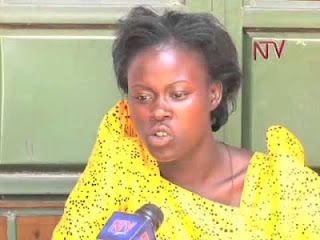Wednesday, September 19, 2012
Behold, the youngest lawmaker in Africa
KAMPALA, Uganda (AP) — A teenaged young woman fresh out of high school has won a seat in Uganda's parliament, adding to the ruling party's majority but embarrassing some who say her success lowers expectations of lawmakers in the East African country.
Proscovia Oromait, who is 19 and a college hopeful, contested elections deep in eastern Uganda to fill the seat left vacant by her father's death. President Yoweri Museveni's ruling party had been desperate for a win there, having lost seven in eight parliamentary by-elections this year. The polls have come to be widely seen as a test of Museveni's popularity, and some party bosses calculated that she would win with a sympathy vote. The result was Uganda's youngest lawmaker ever — and a boost for Museveni's party.
Michael Mukula, a lawmaker who is one of the ruling party's deputy chairmen, said Oromait's win had sent "a lot of ripples" through the organization, dividing it into reformers and hardliners who want to win by any means necessary.
"I am a bit concerned and taken aback because of her lack of experience and lack of exposure," Mukula said of Oromait. "This is not a constituency you want to give a child of that age to shoulder."
Oromait will represent a place called Usuk, where dirt roads become flooded in the rainy season and where there is only one functional high school. This rural constituency of some 100,000 people is said to be thoroughly impoverished, even by Uganda's standards. But last week it was thrust firmly into the national limelight, the latest battleground in the ruling party's quest to claim a reassuring win and silence critics who say Museveni's popularity is starting to fade. Museveni, who took power by force in 1986, has not said if he will run again in 2016, when his current term expires, but he faces growing opposition within and outside his party to step down and preside over the first peaceful transfer of power in Uganda's history. Some opponents suspect he may be grooming his son or wife to take over when he retires.
In choosing Oromait, some say, the ruling party was simply trying to stay afloat at a time of rising political activism against the Museveni regime, which has been criticized by rights groups as too eager to use violence to retain power.
"She is a victim of these circumstances," said Nicholas Opio, a Kampala-based political analyst, referring to the ruling party's eagerness to win after a string of losses. "I don't think she was prepared for this. She had even never voted."
However, according to Opio, Oromait "will be at home in the House in the sense that not much is required of her."
Museveni's party has an overwhelming parliamentary majority, a fact that contributes to the sense of contempt some Ugandans feel for legislators. In 2005, with Museveni facing a stiff challenge from a former insider, lawmakers agreed to remove presidential term limits from the constitution, a process condemned by opposition activists and Western diplomats as a backward step for Uganda's young democracy. Many lawmakers have become notorious for avoiding plenary debates, with the speaker recently threatening to punish those who deliberately choose to stay away.
Barnabas Tinkasiimire, a lawmaker with the ruling party who has the reputation of a nonconformist, said the election of Oromait is an embarrassment to Uganda. "When you analyze that baby," Tinkasiimire said, referring to the teenage lawmaker, "what kind of knowledge and experience does she have? This is unbelievable."
Oromait comes across as vaguely confident in interviews, recently telling reporters: "It's not about the age ... it's the brain."
Mwambutsya Ndebesa, a professor of political history at Uganda's Makerere University, said she could turn out to be a much more inspirational figure than some of her older counterparts.
"She may not have any ideas yet," said Ndebesa, "but she has the ability to learn."
This note was copied from Yahoo News.
Subscribe to:
Post Comments (Atom)


No comments:
Post a Comment